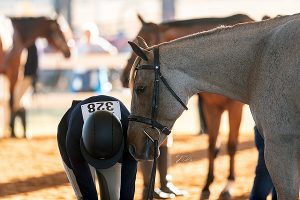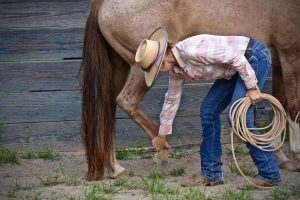An EC Blog by Kathleen Beckham – Inconvenienced
By Kathleen Beckham of Ethos Equine:
Years ago, I had a baby horse, and when he was about 18 months old, I had the opportunity to have an equine chiropractor work on him. He was wiggly and squirrelly, and I apologized to the chiropractor for that. “That’s okay,” she said, “Little babies haven’t learned how to be inconvenienced yet.”
That was big for me. So big. “Inconvenienced.” I hadn’t thought of that before, but it was the perfect word for it. We don’t want our horse to tolerate being hurt, or being treated unfairly, but he dang sure needs to be able to be inconvenienced.
From that day forward, “being inconvenienced” became a more thoughtful part of my horse work. I started to see some of the “issues” students were having with their horses as having to do with the horse’s inability to be “inconvenienced” without becoming very anxious. I also saw the stress that some of my students experienced when they knew they were going to inconvenience their horses. It turned out it was, indeed, a “thing.”
The ability to be inconvenienced and be resilient about it – it’s a skill. It’s a skill for people, it’s a skill in dogs, and it’s a skill in horses. It’s a skill that needs to be purposefully taught, and then carefully developed and expanded over time. It should be part of any training process for horses, because it’s something that they don’t necessarily come “from the factory” with, and it’s something they really need to succeed in the human world we insist they live in.
For a horse, “being inconvenienced” can be things like being asked to work while other horses are eating, standing tied, not being fed first, being turned out or brought in a “non-preferred” order, standing next to strange horses and not being allowed to socialize, having their feet picked up, going down the trail while other horses speed by, having veterinary work done, getting in a trailer or other small space, not being allowed to graze while working… I think you get the picture. Once I started thinking about my horse being “inconvenienced,” I saw it everywhere. Gosh, a LOT of a horse’s life in the human world is inconvenience. I also started to see how much stress a horse who had not learned to be resilient about being inconvenienced could experience.
It’s not always possible to remove the inconveniences in our horses’ lives, and I’m not sure that’s the way to go anyway. A horse who is resilient about being inconvenienced develops many other positive qualities because of his ability to be inconvenienced. He learns to self-soothe, he learns to think before he reacts. He learns patience and he learns to be flexible. He learns not to get stuck in patterns and expectations. He learns to be softer and more thoughtful. He learns to be calmer and quieter.
A horse who develops the ability to be inconvenienced as a principle of his training/life is less likely to be herd bound, gate sour or barn sour. They’re more likely to trailer load easily, to tie quietly and to learn whatever we are trying to teach them. It’s kind of the “secret sauce” of horse training, if you know about it.
Being inconvenienced might start very small. The first time one of our youngsters is inconvenienced might be the first time we have him on a lead rope, and he wants to go left and I want to go right. Or he wants to eat grass and I want to take him for a walk or take him over to get his feet trimmed. So it might start very small at first. But I’m aware of it. I’m aware of when he’s inconvenienced, and I’m aware of how much inconvenience he’s able to take, for his stage of development. I am carefully and thoughtfully, methodically building his “fitness” to be inconvenienced.
Those little, fleeting inconveniences will turn into bigger ones eventually, like being left outside or in the barn by himself, or standing tied to the trailer all day, or working in the rain, or working while the farm is being fed. Those are much bigger inconveniences than being asked to turn left when you want to turn right. A working horse, or a horse we want to be able to take places and do things with, he’s really got to be able to be inconvenienced. That makes him much safer and more fun to be with.
Being inconvenienced is also about a horse being practiced at changing his mind. So he can practice thinking about one thing (“I want to go sniff that horse over there”) and change what he’s thinking about (“Hey horse, let’s go over here, away from that horse, and do a stop/back/bring our front end around.”). To do that, we have to be able to decipher what our horse is thinking about, and then become proficient at causing him to change his thoughts.
Horses who can’t change their thoughts do not deal with inconvenience very well, while horses who are good at changing their thoughts will be much better at being inconvenienced.
This is different from “desensitization,” and it’s not about getting the horse “shut down. It’s not about hurting him, or flooding him, or setting him up to fail. It is literally about building the horse’s mental flexibility, by degrees. It’s methodical and progressive. It’s sometimes a delicate balance, and it can be something that takes some awareness and skill on the human’s part. It’s no different than building a horse’s physical fitness and abilities, it’s about choosing the right size steps for that horse’s fitness level.
A horse whose ability to be inconvenienced has been well-developed will be quieter, less anxious, less ulcer-y, and more physically and mentally balanced. They will have more brain-space available for things of our choosing.
This ability to be inconvenienced, it’s a gift to the horse. It’s a gift to him, so he doesn’t have to suffer the unnecessary stress and anxiety caused by his lack of mental flexibility. Done mindfully, it doesn’t have to be scary or dangerous. And done earlier, it’s easier. And older horse who has never been inconvenienced, that’s going to be more difficult than a younger horse with no preconceived ideas about things.
At the end of the day, this is a practical thing. We choose to have our horses live in our human world, so if they can be inconvenienced, that makes living in our world a lot easier for them. It’s a gift, not a burden to them.
Thank you to Kathleen for allowing us to share this piece of wisdom for horsemen everywhere.
You can find her website here: https://www.ethosequine.com/, and follow her on Facebook at Ethos Equine and Kathleen Beckham.













